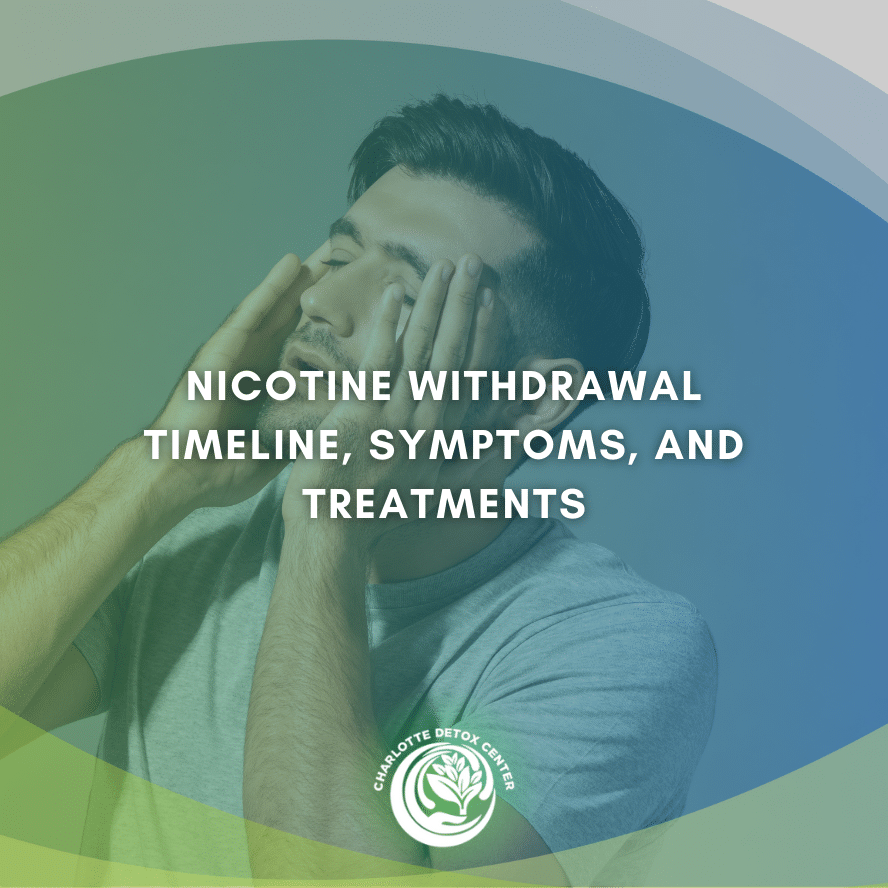Nicotine Withdrawal Timeline, Symptoms, and Treatments

Medically Verified: 2/1/24
Medical Reviewer
Chief Editor

All of the information on this page has been reviewed and verified by a certified addiction professional.
When someone stops smoking, they may experience nicotine withdrawal. While usually not dangerous, the symptoms that go along with nicotine withdrawal can make people very uncomfortable. This can cause people to start smoking after a short period.
People who want to finally quit smoking for good must learn about the symptoms of nicotine withdrawal and how to manage them without starting smoking again. Understanding the nicotine withdrawal timeline and what to expect can help you successfully quit smoking once and for all.
If you need more information or want support during nicotine withdrawal, reach out to the specialists at Charlotte Detox Center. We provide a range of supportive services and programs for people living with many forms of substance abuse.
Symptoms of Nicotine Withdrawal
When people quit smoking or reduce the amount of nicotine they consume, they usually experience a range of unpleasant physical and behavioral symptoms.
Physical
After a period of regular nicotine intake, a person’s body adapts to the presence of the chemical. Abruptly quitting smoking or using nicotine replacement therapy results in the body going through nicotine withdrawal. The physical symptoms associated with this include:[1]
- Increased appetite and weight gain
- Restlessness
- Insomnia
- Cravings
- Fatigue
People may return to smoking if they cannot find a healthy way to cope with their physical symptoms.
Behavioral
Often, smoking becomes part of a person’s way of coping with stress, boredom, or depression. When a person suddenly stops smoking, they may experience:[1]
- Depression
- Anxiety
- Irritability
- Poor concentration
It is important that people actively find new ways to cope with uncomfortable feelings without returning to smoking.
The Nicotine Withdrawal Timeline
The duration and severity of a person’s nicotine withdrawal symptoms mainly depend on how long they smoked and the amount of nicotine they regularly took in. People who stop smoking experience symptoms on a general timeline.
Day one
A person’s withdrawal symptoms begin.
One week
Restlessness, anxiety, depression, fatigue, and appetite changes intensify during the first week. People often experience intense cravings during the first week.
One month
Often, physical and emotional symptoms begin to fade over the course of a month. Cravings may still be present but other symptoms usually dissipate after a month.
Coping With Nicotine Withdrawal
Once you know what to expect during the nicotine withdrawal timeline, you can prepare to cope with those challenges in healthy ways.[2]
- Irritability: The best way to handle the irritability you experience during nicotine withdrawal is to give yourself a lot of space. If possible, plan to spend as much time on your own as possible to avoid becoming irritable with friends or family. This is a short period and you can return to your social life later.
- Anxiety and restlessness: Use other activities to distract yourself and provide relief for restlessness. Exercise has been proven to be effective at helping people cope with anxiety and depression. Find new ways to cope with stress–journal, practice meditation, talk to a friend, or practice a hobby.
- Insomnia: An additional benefit of exercise is that it helps people get better sleep. Exercise outdoors during the middle part of the day for even more sleep-boosting benefits.
- Weight gain: Smoking can dull your sense of taste and smell. One of the best parts of quitting smoking is that you get to really experience food again. Eat healthy, regular meals to keep your appetite under control–and take some time to enjoy food again.
These tips can help you manage some of the common discomforts of nicotine withdrawal. If you are still experiencing uncomfortable symptoms for a long period or you can’t cope with your cravings, don’t be afraid to reach out for professional support.
Treatment for Long-Term Nicotine Withdrawal
For some people, quitting smoking feels nearly impossible. They may struggle with cravings or other symptoms for longer than others, or they may experience emotional or behavioral symptoms that interfere with their life.
Often, people who experience a longer nicotine withdrawal period may benefit from Cognitive Behavioral Therapy (CBT). This effective form of therapy helps people identify disruptive or harmful beliefs and patterns and develop healthy coping skills to manage them. Cognitive Behavioral Therapy is used in many different treatment settings and on an outpatient basis. It is an important tool that can be used to support people in nicotine withdrawal and beyond.
Several organizations provide resources to people who want to stop smoking or using other tobacco products.
Learn More About the Nicotine Withdrawal Timeline at Charlotte Detox Center
If you or someone you love needs support or treatment to stop smoking, or if you have other substance abuse treatment needs, reach out to the Charlotte Detox Center. We offer a range of services and treatment programs to help people overcome substance abuse and addiction. Reach out today to learn more about how we can support you.
References:
